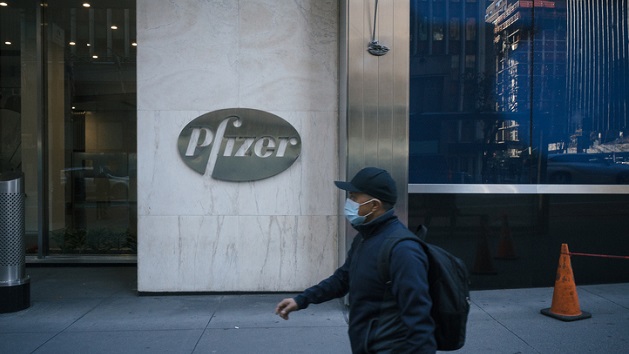Now that an independent panel endorsed 1st COVID-19 vaccine, here's what happens next
Massimo Giachetti/iStockBy ANNE FLAHERTY and STEPHANIE EBBS, ABC News
(NEW YORK) — An independent advisory panel of infectious disease experts, doctors and scientists recommended Thursday that the U.S. government authorize the nation’s first COVID-19 vaccine for people over the age of 16.
It’s a major milestone in the effort to get the vaccine to hospitals and pharmacies, as the death toll from the pandemic continues to climb.
Experts: There are some unknowns, but the benefits outweigh the risks
After hours of drilling down into data produced from a clinical trial involving 44,000 people, the group of experts — known as the Vaccines and Related Biological Products Advisory Committee — voted 17 to 4 in favor of the vaccine for people over 16 years of age.
Several members raised concerns about unknowns about the vaccine, including its potential to trigger allergic reactions and little data on how it impacts pregnant women. Members also expressed concern there wasn’t enough data to support giving the vaccines to teens who are 16- and 17-years-old.
At issue was this question: “Based on the totality of scientific evidence available, do the benefits of the Pfizer-BioNTech COVID-19 Vaccine outweigh its risks for use in individuals 16 years of age and older?”
To that point, most panel members agreed.
While the panel’s recommendation is a crucial step, it’s ultimately up to the U.S. Food and Drug Administration to authorize the vaccine. Agency officials clearly are leaning in that direction, but aren’t saying when that decision will come.
“We can act quickly, and we intend to. We understand the urgency of the situation,” Stephen Hahn, commissioner of the FDA, told ABC’s “Good Morning America” on Thursday, ahead of the advisory committee meeting.
Pfizer said more study is needed on vaccine’s impact on asymptomatic transmission
Pfizer outlined its case Thursday for the nation’s first vaccine, noting the urgency at hand.
“Throughout 2020, we have been asked often: How can this be done in a year or less, when the process normally takes many years? Well, that development, or anything else in a pandemic setting is not normal,” said Kathrin Jansen, the company’s head of vaccine research.
But as much data as Pfizer was able to collect as the virus spread across the globe, it still doesn’t know much about asymptomatic cases.
Jansen said the company wants to continue to conduct sereological surveys to “monitor and explore whether our vaccine is efficacious against asymptomatic infection.”
FDA will warn against giving the vaccine to people with severe allergies
Amid celebrations of the vaccine being rolled out in the U.K. this week were reports that two people experienced serious allergic reactions and had to rely on adrenaline injections.
That’s a big concern for the estimated 1 in 50 Americans who live with the threat of anaphylaxis, which is a severe allergic reaction.
Pfizer says it had already excluded from its trials people known to have adverse reactions to vaccines and questions remain about what exactly happened.
At the meeting Thursday, the FDA suggested they aren’t willing to hold up the vaccine because of the concerns. Marion Gruber, a senior FDA vaccine official, said health providers will be warned in a fact sheet not to provide the vaccine to people with a history of severe allergies. Also, the FDA will recommend an epinephrine injection is available at the time of the injection.
The FDA also wants Pfizer to include allergic reactions as part of a pre-existing monitoring program the company has established to track the immunizations.
Dr. Paul Offit, a member of the advisory committee and professor of pediatrics division of infectious diseases at The Children’s Hospital of Philadelphia, urged Pfizer to study people with specific allergies such as eggs or peanuts.
“You’re talking about tens of millions of people who are going to not get this vaccine because of the comments that were made” about the U.K. reactions, he said at Thursday’s meeting.
More study is a practical solution, he said, because “this issue is not going to die until we have better data.”
FDA: Two people who got the vaccine died, but not because of the vaccine
A total of six people died in the trial: two of them had received the vaccine and four got the placebo.
Of the two who had been given the vaccine, one experienced “cardiac arrest” two months after the second vaccination dose. The second person died from “arteriosclerosis” three days after receiving the first shot. Both were over the age of 55.
“All deaths represent events that occur in the general population of the age groups where they occurred, at a similar rate,” the FDA wrote.
It also was noted in the meeting that there were four cases of Bell’s palsy in the vaccine group compared with no cases in the placebo group. The FDA noted in its report on the vaccine that while that is a “numerical imbalance,” it does “not represent a frequency above that expected in the general population.”
FDA scientists noted they are going as fast as they can
The FDA’s top career scientists noted that staff at the agency had worked tirelessly — through the night and over Thanksgiving — to scour the data.
“The American public demands and deserves a rigorous, comprehensive and independent review of the data,” said senior FDA Dr. Doran Fink.
Dr. Peter Marks, director of FDA’s Center for Biologics Evaluation and Research, noted staff working “tirelessly” throughout the weeks including the holiday “when they could have spent time with their families.”
ABC News’ Arielle Mitropoulos, Eric Strauss, Sony Salzman and Sasha Pezenik contributed to this report.
Copyright © 2020, ABC Audio. All rights reserved.

